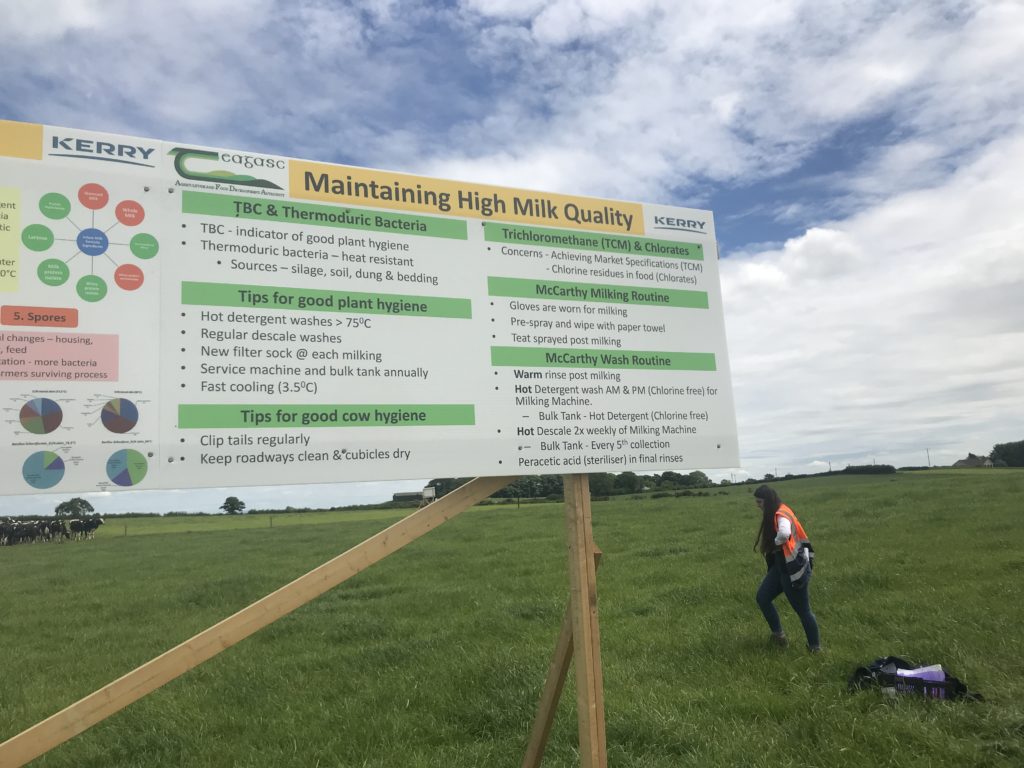The National Dairy Council (NDC), in conjunction with Teagasc, held a farm walk last week (Wednesday, June 15) on the McCarthy family’s farm.
The McCarthy family from Feenagh, Co. Limerick, was the NDC milk quality awards’ overall winner for 2021.
The family milks 170 Holstein-Friesian-type cows. Last year, the herd averaged 4.20% butterfat, 3.59% protein and its total bacteria count (TBC) was 4,000, somatic cell count (SCC) was 108,000 and its thermoduric averaged 127,000.
Speaking at the event John Murphy, milk quality coordinator at Kerry Agribusiness, outlined some of the measures used by the family to control and maintain TBC levels on the farm.
“The TBC on the McCarthy’s farm is excellent, with a weighted average for 2020 of three, and four for 2021,” said John.
“These results were achieved as we moved to colerine-free cleaning of the milking machine and bulk tank, which was a huge shift for farmers.
“There is huge credit due to all the farmers that have managed to change over – with little or no affect on overall TBC or thermoduric.”
Continuing, John posed a question: “Your milking parlour is a closed system, so how does the bacteria get in?
“It gets in from cows’ teats; once a cow’s teat comes into contact with the cluster, the bacteria can be introduced,” he said.

“If you can reduce the bacteria load on the teat, it is one major step to keeping your bacterial load low – along with a good, consistent washing routine of your milking machine and bulk tank,” he added.
Accompanying measures
John said that farmers first and foremost need to look at the infrastructure that they have on their farms.
Farmers need to keep the roadways in good condition and clean, while also keeping the cubicles dry and topped up with lime.
When the cows are housed the scrapers need to be running on a regular basis.
John also stated that it is important to keep the tails of the cows clipped in order to keep dirt from building up.
Moving on to the milking routine, John highlighted the importance of wearing gloves during milking, as hands can harbour bacteria.
If TBC or thermoduric bacteria are an issue on your farm, you may need to pre-spray your cows to remove the bacterial load on the teat.
John reminded the farmers in attendance that if they do pre-spray, it is important to wipe cows afterwards and use a spray that is also suitable for post spraying of cows.

Lastly, John spoke about washing the milking machine and the importance of having water at the correct temperature for a hot wash.
John said that a hot detergent wash needs to be completed at least seven times/week with a water temperature of of 75° or greater.
He said that the McCarthy family completes 14 hot washes a week.
He also commented on the importance of a regular descaling of the plant and that this should be completed a at least three times/week.
Some of the other measures he highlighted were using a new milk filter for each milking, fast cooling of milk and getting the milking machine serviced regularly.
